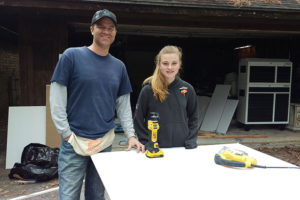Here are 10 smart habits that Doctors can implement to make their home buying experience a positive one.
Organize
The process of getting approved for a doctor mortgage requires a fair amount of documentation. Save time and headaches by obtaining a list of required documents before you apply for a doctor mortgage loan. Documents you will likely need to supply your mortgage lender include:
- Proof of identification
- Proof of residency if you’ve been matched to a residency program
- Tax returns and W2s from the previous two years, if you’ve worked during that time
- The last three months of statements for your checking, savings and brokerage accounts
- Loan papers or monthly statements for debt you currently are paying, including student loans, car payments and credit card debt
- The source of your down payment, if applicable
This is a smart way to kickstart your doctor mortgage loan comparison process – a key step in the home buying experience.
Understand how you will be evaluated by underwriters
Underwriting is the process of assessing a borrower’s ability to repay the loan. Underwriters review your income, debt and other financial factors to determine how much risk you pose to the lender. This process will not only determine whether you qualify for a physician mortgage, it will also determine the interest rate you will pay on the loan.
By knowing what underwriters look for, you may have time to make financial changes before you apply for a mortgage.
Underwriters will look for:
- Your credit score and credit history, especially a history of late payments
- Your current debt load
- Bankruptcies or foreclosures
- Your rental history
- Your income history
- Citizenship
Get pre-approved
One of the best ways to expedite the home buying process is to get pre-approved for a doctor mortgage. Pre-approval will not only ensure that you qualify for a mortgage, it will also inform you how much you can borrow. This will help you establish a price range for the homes you look at.
Pre-approval can also speed up the seller’s acceptance of your offer. If the seller is fielding multiple offers, they may not consider an offer that is contingent on the buyer obtaining financing. Many sellers prefer to close the deal as quickly as possible and may only deal with buyers that already have financing in place.
Make a wish list
As a doctor, your income gives you more options than most when it comes time to buy a home.
In 2018, the median doctor home price was $520,000 – more than twice as much as the overall median home price.
However, you probably won’t have time to look at a lot of houses given your busy schedule. That’s why it’s best to narrow down the list of what’s available. Put together a list of attributes that are most important for your new home, such as the number of bedrooms and bathrooms, the size of the kitchen, the size of the lawn, the style of the home, and the location.
Work with the right professionals
Doctors have unique circumstances and mortgage needs. Therefore, you should work with a real estate agent and a mortgage lender who has worked with doctors.
Real estate agents who haven’t assisted other doctors may have trouble finding the right properties and guiding you through the transaction.
The best way to find real estate professionals to help you is to seek referrals from other medical professionals who have gone through the home buying process or ask your mortgage professional for a list of physician endorsements.
Likewise, lenders without experience working with physicians may not understand how physician mortgage loans work. They also may not understand your financial situation.
Here’s a quick, easy way to find and compare lenders that offer doctor loans based on your financial criteria.
Don’t add to your debt until after closing
One of the factors that underwriters evaluable is your debt-to-income (DTI) ratio. This is a way to measure a potential borrower’s overall financial health. The ratio measures the percentage of a borrower’s monthly income that’s required to pay their current monthly debt payments.
Lenders will limit the amount of debt borrowers can have in order to be approved for a mortgage. The higher your DTI, the higher your risk of being denied or having to pay a higher interest rate.
Once you begin the process of getting a mortgage loan, it’s important not to add to your debt until after you’ve closed on your property. That means don’t borrow money for a car, and don’t add to your credit card debt.
Consider your potential home’s resale value
If you’re buying your first home, chances are it won’t be your last. In five or 10 years, you may want or need to move, either because your career takes you to a new city or you simply want to upgrade your home.
As you evaluate homes to buy, you may want to consider what the next buyer will want. Talk to your real estate agent about the most popular features among buyers in your area. Find a home with as many as those as possible.
As a popular real estate adage goes, the most important factor determining property value is location, location, location. Sure, there are plenty of home improvement projects you can take on to boost curb appeal. But selecting the right location today may very well be the most important decision you make to generate a decent profit at resale down the road.
You may not have children, but the next owner might. Therefore, you may want to consider the quality of the school district your house is located as well.
Pay attention to location
You should also narrow down your list of potential homes by choosing the type of location you want to live.
Do you want to live downtown, a nearby suburb or in the country? Do you want a short commute to work or will you be OK for a long drive to get away from the noise and chaos? Do you prefer proximity to restaurants, parks, entertainment districts, or other amenities?
Know your HOA before you sign
If you’re looking to buy a condo, townhouse, or a house in a gated community or planned development, your future home will likely be part of a homeowner’s association (HOA). An HOA helps to maintain property and enforce regulations within a development.
Before you settle on a home within an HOA, you should:
Know how much members pay in dues, which will add to the cost of owning your home.
Verify the regulations that govern your home’s appearance, what’s expected of you as a property owner, and what improvements you are and are not allowed to make to your home.
Understand how rules are enforced, including whether fines are imposed.
Pay cash for your furnishings
It may be tempting to increase your debt load to furnish your new house. Instead, it’s more financially prudent to pay cash and avoid having another large monthly payment.
If you don’t have enough cash to furnish your entire home at once, buy what you can. Start with the most important items like a bed, a chair or two and any appliances that did not come with the home. Then as you have more funds available you can add furniture and accessories to additional rooms.




